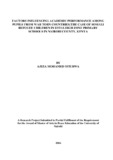| dc.description.abstract | This study examined the influence of Culture and interpersonal conflict on the academic
performance of Somali refugee children in school using seven primary schools in
Eastleigh zone. Eastleigh is resident to different communities both locals and people from
neighboring countries running away from conflicts and instability in their respective
countries. This place has traditionally had majority inhabitants from the northern Kenya
region who are Kenyans of Somalis decent, this make it attractive to Somalis from
Somalia who feel more at home with fellow kinsmen albeit from a different country to
also settle there.
Eastleigh boasts of many schools at Pre-primary, primary and secondary levels and other
informal places of learning. These institutions are not only used as centers of learning but
also expected by parents’ act as centers of trauma healing and rehabilitation of children
affected by war. The children however face challenges as soon as they are enrolled in
school due to different culture and way of doing things. Somali culture espouses
forcefulness and aggression and is less courteous.
The aim of the study was to outline the nature and effects of Somali culture, teacher
training and interpersonal conflicts on academic performance of the refugee pupils, the
objectives of the study are;To investigate the influence of Culture and on academic
performance among Somali refugee pupils in primary schools in Eastleigh zone, To
enquire how interpersonal conflict influence academic performance among Somali
refugee pupils in primary schools in Eastleigh zone and To Analyze the influence of
teachers training on the academic performance of the Somali refugee pupil in Eastleigh
zone. Following Galtung’s theories, the study demonstrated the need to address deeper
symptoms of “cultural violence” that Somali refugee children also face. The study
employed descriptive research design. A purposive sample of 7 head teachers, 42 teachers
and 300 children, was drawn from the target population of 1000 students, 140 teachers
and 7 head teachers drawn from 7 primary schools in Eastleigh zone. Data was collected
using questionnaires; the study relied on both qualitative and quantitative methods of data
analysis. The Data was synthesized and reported thematically. Major findings from the
study imply that lack of understanding of the English language by the refugee pupils,
affect their academic performance immensely, the study also established that, religion
affects the academic performance of the refugee child to a great extent, the researcher
established that the children do leave school early to go and attend madrasas, this in turn
affects their academic performance, further, the study established that early marriages
also do affect the academic performance of the refugee pupils. The researcher
recommended that, the teachers should work in collaboration with the local authority to
discourage early marriages, the school head teachers should ensure that their teachers do
receive training on how to handle refugee pupils. Finally the study recommended a
similar study to be carried out on other regions with a high number of refugee pupils. | en_US |



